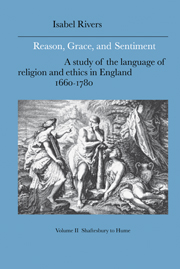Book contents
- Frontmatter
- Contents
- Preface
- Abbreviations
- Introduction
- 1 The true religion of nature: the freethinkers and their opponents
- 2 Shaftesbury and the defence of natural affection
- 3 Defining the moral faculty: Hutcheson, Butler, and Price
- 4 The ethics of sentiment and the religious hypothesis: Hume and his critics
- 5 The conflict of languages in the later eighteenth century
- Bibliography
- Index
2 - Shaftesbury and the defence of natural affection
Published online by Cambridge University Press: 15 December 2009
- Frontmatter
- Contents
- Preface
- Abbreviations
- Introduction
- 1 The true religion of nature: the freethinkers and their opponents
- 2 Shaftesbury and the defence of natural affection
- 3 Defining the moral faculty: Hutcheson, Butler, and Price
- 4 The ethics of sentiment and the religious hypothesis: Hume and his critics
- 5 The conflict of languages in the later eighteenth century
- Bibliography
- Index
Summary
Itt is not with mee as with an Empirick, one that is studdying of Curiositys, raising of new Inventions that are to gain credit to the author, starting of new Notions that are to amuse the World and serve them for Divertion or for tryall of their Acuteness … Itt is not in my case as with one of the men of new Systems, who are to build the credit of their own invented ones upon the ruine of the Ancienter and the discredit of those Learned Men that went before.
… What I count True Learning, and all that wee can profitt by, is to know our selves; what it is that makes us Low, and Base, Stubborn against Reason, to be Corrupted and Drawn away from Vertue, of Different Tempers, Inconstant, and Inconsistent with ourselves; to know how to bee allways Friends with Providence though Death and many such Dreadfull Businesses come in the way; and to be Sociable and Good towards all men, though They turn Miscreants or are Injuriouse to us.
Whilst I can gett any thing that teaches this; Whilst I can search any Age or Language that can assist mee here; Whilst Such are Philosop[h]ers, and Such Philosophy, whence I can Learn ought from, of this kind; there is no Labour, no Studdy, no Learning that I would not undertake.
Shaftesbury to Locke (1694)- Type
- Chapter
- Information
- Reason, Grace, and SentimentA Study of the Language of Religion and Ethics in England, 1660–1780, pp. 85 - 152Publisher: Cambridge University PressPrint publication year: 2000
- 1
- Cited by

